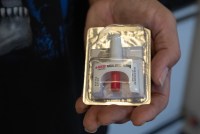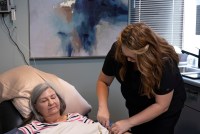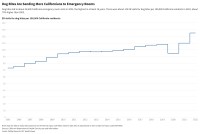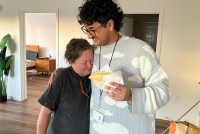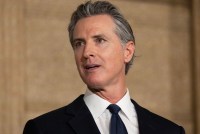Latest Morning Briefing Stories
California Takes Up White House Call to Toughen Gun Storage Rules
State lawmakers are weighing legislation that would require gun owners to keep their firearms locked up most of the time, a move advocated by the Biden administration.
The Supreme Court Confronts a Public Health Challenge: Homeless Encampments
Homelessness is a soaring public health crisis, with a record 653,000 unhoused people in the United States, according to federal estimates. Tent and recreational vehicle encampments have exploded in recent years, crowding streets and sidewalks from Portland, Ore., to New York. In California, where roughly a third of all the nation’s homeless people live, doctors […]
California Lawsuit Spotlights Broad Legal Attack on Anti-Bias Training in Health Care
State laws requiring doctor training on how bias affects treatment violate teachers’ right to free speech, opponents say.
California Gov. Newsom Wants Voters to Approve Billions More to Help the Homeless. Will It Help?
A March 5 ballot initiative seeks $6.4 billion to build thousands of new housing units and provide mental health treatment for homeless people — on top of the billions already being spent to address the public health crisis. Despite significant support from health and law enforcement officials, many front-line workers are skeptical that more money is the answer.
New Eligibility Rules Are a Financial Salve for Nearly 2 Million on Medi-Cal
Nearly 2 million Medi-Cal enrollees, mainly people who are aged, disabled, or in long-term care, can now accumulate savings and property without limitations and still qualify for the state’s health insurance program for low-income residents. They join an additional roughly 12 million enrollees who already had no asset limits.
California Prison Drug Overdoses Surge Again After Early Treatment Success
Drug overdose deaths in California state prisons rebounded to near record levels last year, a big setback for corrections officials who thought they were on the right track with medication-assisted treatment efforts. Prison officials and attorneys representing prisoners blame fentanyl.
FDA’s Plan to Ban Hair Relaxer Chemical Called Too Little, Too Late
The FDA’s recent notice that it would move to ban formaldehyde in hair-straightening products comes more than a decade after researchers raised alarms about health risks. Scientists say a ban would still leave many dangerous chemicals in hair straighteners.
Even in Bright-Blue California, Abortion Is on the Ballot
The race to replace the late Democratic Sen. Dianne Feinstein is in full swing in California. Although the state enshrined abortion rights into its constitution, the prospect of a national abortion ban has the candidates vying for a Senate seat putting a spotlight on reproductive rights. Or, at least the Democrats are. Steve Garvey, a […]
Is Housing Health Care? State Medicaid Programs Increasingly Say ‘Yes’
States are using their Medicaid programs to offer poor and sick people housing services, such as paying six months’ rent or helping hunt for apartments. The trend comes in response to a growing homelessness epidemic, but experts caution this may not be the best use of limited health care money.
Back From COP28, California Climate Leaders Talk Health Impacts of Warming
Three leading California officials who represented the state at the United Nations climate talks late last year reflect on climate change’s growing threat to human health — and explain what the state is trying to do about it.
Ketamine Therapy for Mental Health a ‘Wild West’ for Doctors and Patients
Ketamine, approved by the FDA as an anesthetic in 1970, is emerging as a major alternative mental health treatment, and there are now more than 500 ketamine clinics around the country. But with little regulation and widely varying treatment protocols, it’s a medical “wild West.”
A Record Number of Californians Are Visiting Emergency Rooms for Dog Bites
There were nearly 50,000 emergency room visits for dog bites in California in 2022. The rate of such visits per capita is up about 70% since 2005.
In Los Angeles, Occupational Therapists Tapped to Help Homeless Stay Housed
Los Angeles County is deploying a small team of occupational therapists to help newly housed individuals adjust to life indoors. Therapists are trained to recognize disabilities and help with basic living skills, such as hygiene and cleanliness, that can help prevent clients from getting evicted or slipping back onto the streets.
What the Health Care Sector Was Selling at the J.P. Morgan Confab
When bankers and investors flocked to San Francisco for the largest gathering of health care industry investors, the buzz was all about artificial intelligence, the next hit weight-loss drug, and new opportunities to make money through nonprofit hospitals.
Climate Change Raises Pressure on Biden To Keep Workers Cooler
With climate change posing rising threats to human health, the Biden administration is drafting federal rules to protect construction crews, warehouse workers, delivery drivers and the rest of America’s workforce from extreme heat. The regulatory effort has been years in the making, and its fate is far from certain. The Occupational Safety and Health Administration […]
Delicate Labor-Industry Deal in Flux as Newsom Revisits $25 Minimum Health Wage
In spite of labor concern about any rollback, Gov. Gavin Newsom is revisiting California’s planned $25 minimum wage for health workers less than three months after approving the measure despite an uncertain price tag. The projected $4 billion first-year cost forms part of the state’s estimated $38 billion deficit.
States Begin Tapping Medicaid Dollars to Combat Gun Violence
The Biden administration is allowing states to use money from the insurance program for low-income and disabled residents to pay for gun violence prevention. California and six other states have approved such spending, with more expected to follow.
Doctors Are as Vulnerable to Addiction as Anyone. California Grapples With a Response.
The Medical Board of California, which licenses MDs, is developing a program to evaluate, treat, and monitor doctors with alcohol and drug problems. But there is sharp disagreement over whether those who might volunteer for the program should be subject to public disclosure and over how much participants should pay.
California Is Poised to Protect Workers From Extreme Heat — Indoors
Only a few states have rules to protect workers from the growing threat of extreme heat, either indoors or outdoors. California is expected to adopt heat standards for indoor workers in spring, even as federal legislation has stalled.
Bold Changes Are in Store for Medi-Cal in 2024, but Will Patients Benefit?
California’s Medicaid program is undergoing major changes that could improve health care for residents with low incomes. But they are happening at the same time as several other initiatives that could compete for staff attention and confuse enrollees.








